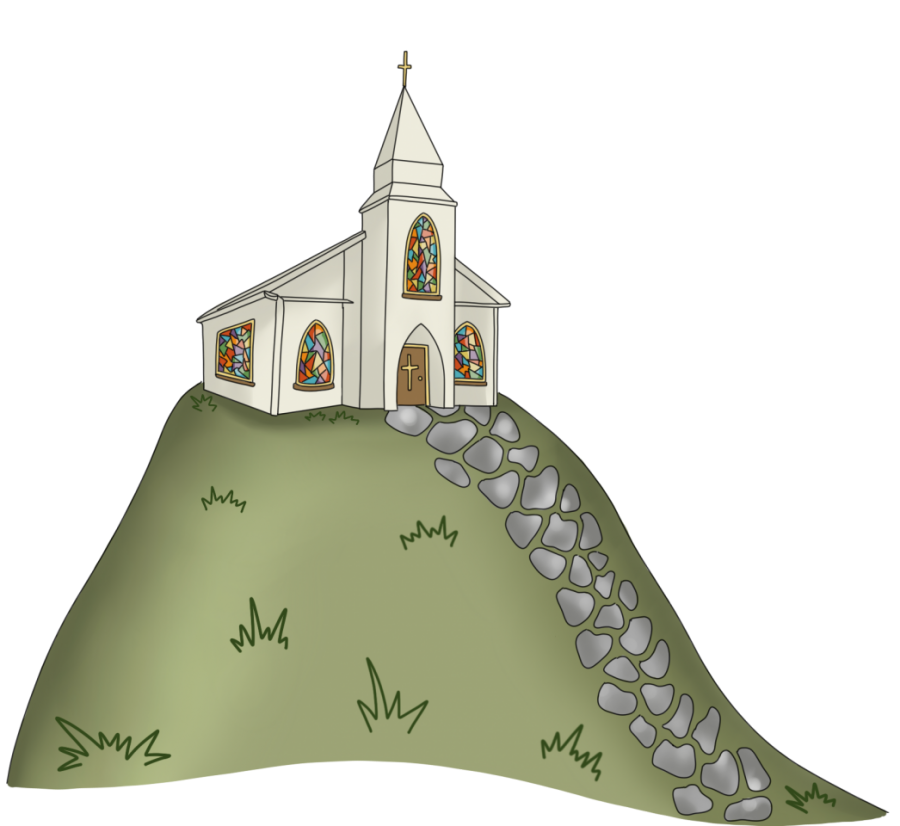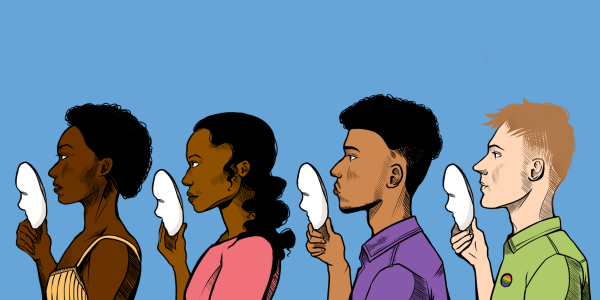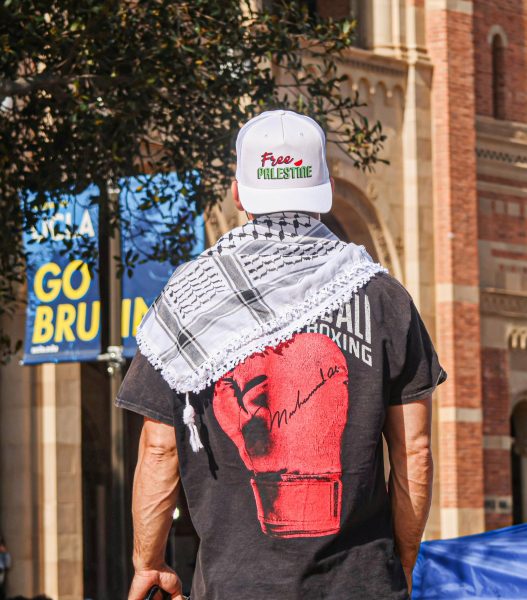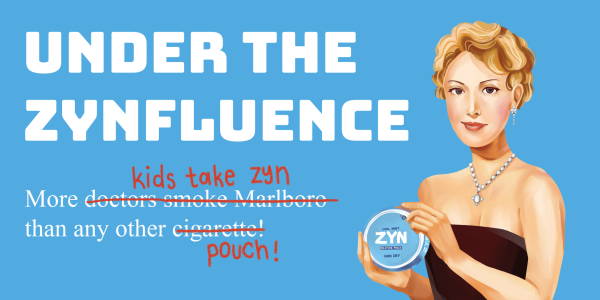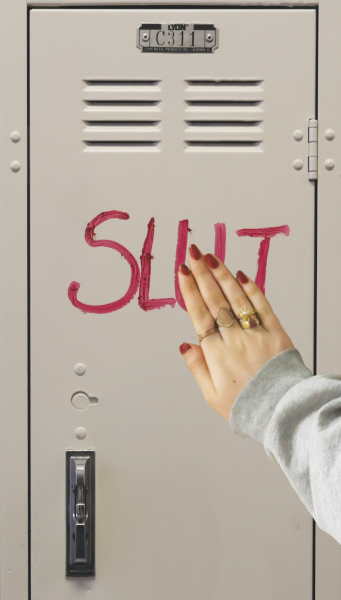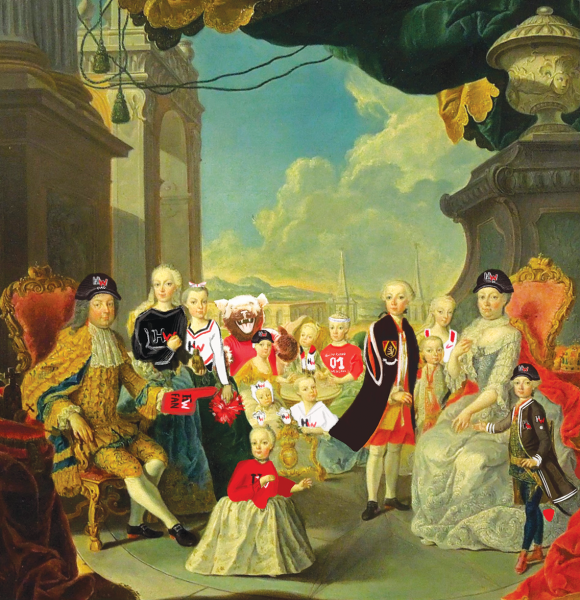Saint Saviour’s Behavior
During the holiday season, students reflect on the meaning of religion and its year-round presence through the chapel and chaplain at the school.
December 25, 2021
In 1914, Saint Saviour’s Chapel was constructed on the corner of Western Avenue and Venice Boulevard at Harvard School for Boys. Twenty-three years later, it was taken down and moved to Studio City along with the institution it was originally built for. The building was named a Los Angeles Historic-Cultural Monument in the 1960s, and for the next three decades, it served as the religious meeting place for the boys of the episcopal school. Even after Harvard School merged with the secular Westlake School for Girls and the newly formed Harvard-Westlake School became a secular institution, the chapel remained standing on what is now the upper school campus.
Despite its use as a space for choral performances and weekly prayer services, Natalie Chan ’23 said she finds it hard to make time to visit the chapel.
“I’m just too busy and stressed [to go to the chapel],”Chan said. “I have to go to library every day to do homework.”
Chan said although she is unable to go to chapel because of the pressures of her daily life, she still tries to make time to find a religious outlet.
“I go to church every Sunday, which I feel fulfills the connection I need,” Chan said. “I have a priest [who] I have been close with since I was little, who offers me guidance in religion.”
Chan said, as a student who considers herself religious, Catholicism has acted as a consistent support system throughout her life.
“I really was able to connect with [my faith] through my experiences in quarantine,” Chan said. “I felt like I saw a lot of people struggling with [the COVID-19 pandemic], but personally I feel like there was this extra guidance for me, like God was watching out for me.”
The Reverend reacts to student activity in the chapel.
Reverend Anne Gardner, who joined the school as Chaplain in 2020, said her role at the school is entirely independent of its secularity, and she is prepared to serve any and all students as a spiritual advisor.
“The religious affiliation [of the school], or lack thereof, is not a concern,” Gardner said in an email. “The chaplaincy offers opportunities for care and conversation no matter what the perspective or affiliation of the student. I am here for those in the community, in whatever capacity they may desire.”
Chan said the Reverend is a valuable resource to the school.
“We need a person who is more informed on the religious standpoint of things,” Chan said. “While the school is a secular community, it also tries to be diverse and inclusive, and I feel that providing some sort of a person of religious authority is really good for that.”
Gardner said working in a community with religious viewpoints different from her own is interesting because it inspires her to reflect on her own faith.
“I find ministering in spaces of such diversity and perspective to be my vocational calling,” Gardner said. “Partly because of my own personal curiosity in the viewpoints of others, [religious,] spiritual and otherwise, and partly because I enjoy working and interacting with an age group that is often absent from traditional religious institutions.”
Gardner said she strives to offer any perspective she can.
“For those who are not religious or spiritual, the opportunity to increase their religious literacy (not conversion, just education) remains,” Gardner said.
Gardner said she appreciates the community outside of the religious realm and said she enjoys the opportunity she has as Chaplain to bring a positive energy to the school every day .
“The students of [the school] are a talented, compelling and fascinating group,” Gardner said. “Whatever I do, whether in front of the collected group or during private one-on-one conversations, is done in hopes that it will make [students’ experiences] a bit more inspired and a bit more supported.”
Students discuss their reasons for not going to the chapel.
Although Gardner said she welcomes interfaith diversity, Ava Tran ’22, who is Buddhist, said she doesn’t feel the Reverend or school reflect her beliefs.
“There’s practically no mentioning or representation of Buddhism, especially Southeast Asian Buddhism at [the school],” Tran said.
Tran said her attitude toward the school’s policy extends to the chapel itself.
“I’ve never been to the chapel because I‘ve never had an event or gathering there that I’ve seen necessary for me to attend,” Tran said. “I’ve never really expressed my religion at school.”
Like Tran, Izzy Kashper ’24 said she is uncomfortable going to the chapel and using its chaplain for spiritual guidance because she is Jewish.
“As a Jew I would not pray in a church,” Kashper said. “I am religious enough that I would not go into a chapel.”
Community explores the value of religion in a secular community.
Kashper said despite her religious affiliations and hesitancy to visit the school’s chapel, the Reverend serves students beyond their own religions. Kashper, who acted in the school’s fall play “J.B.,” said when Gardner spoke with the cast about many universal themes of religion she was able to gain a much deeper connection with the source material.
“[The cast] had a discussion with Reverend Gardner regarding the [Old Testament] story of Job because we were performing a modern retelling of it,” Kashper said. “When the Reverend shared her perspective it helped me to have such a better understanding of my role, and of the play in general.”
Kashper said the Reverend’s insights into the story’s themes helped her realize Gardner’s unique expertise in spirituality, even beyond her own faith.
“We talked about the story’s morals, which are important to all people, religious or not,” Kashper said. “Morals are what make our world run, so it’s not just about being spiritual. That’s something that the Reverend has a lot of knowledge about, knowledge that very few others have.”
Kashper said her peers are not religiously experienced, which results in loss of identity.
“In this generation, there are very few people who practice an organized religion,” Kashper said. “I think we’ve lost many of those traditions, which is sad because I think it brings people together and gives us a sense of self.”
Kashper said, beyond its communal aspects, religion connects with both education and community service.
“I’ve always been taught education is very important, along with serving the community,” Kashper said. “The Old Testament and the New Testament both have those values, so I think that having the chapel here instills those traditional values that are necessary.”
Simon Lee ’23 said he feels more comfortable with the school’s secular support systems than its spiritual ones.
“As someone who’s not on the best terms with his religion, if I ever sought some kind of emotional solace, I would turn to [Upper School Counselor Michelle Bracken] or the [Upper School Counseling Department] instead of going to the chapel,” Lee said.
Lee said, whether religious or not, d having access to a faith oriented emotional outlet is useful for students.
“It’s important for students who consider themselves religious to have a place for spirituality on campus,” Lee said. “Just because we have a chaplain or a chapel doesn’t mean that the school itself is affiliating with any one religion. It is free to anyone who needs it.”
Lee said religion can shape personal and institutional values.































